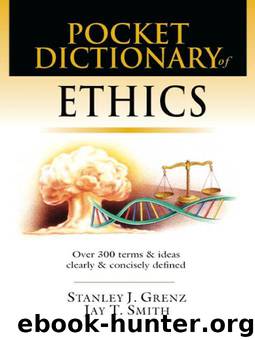Pocket Dictionary of Ethics by Stanley J. Grenz

Author:Stanley J. Grenz [Grenz, Stanley J.]
Language: eng
Format: epub
Tags: Christian Books & Bibles, Theology, Ethics, Politics & Social Sciences, Philosophy, Ethics & Morality, Reference, Religion & Spirituality, Religious Studies, Religious Studies & Reference
ISBN: 083081468X
Amazon: B003NUSBW8
Publisher: IVP Academic
Published: 2010-04-16T21:00:00+00:00
L
labor ethics. The discipline of ethical study that analyzes the moral dimensions of the relationship between labor and management. Labor ethics is especially concerned with the moral questions that arise out of that relationship, such as substandard wages or hazardous work environments. See also business ethics; employment; industrial ethics.
laissez faire. A phrase first used by French writers in the eighteenth century meaning “let do.” In contemporary usage it refers to the theory of political economics that asserts that government should follow a policy of limited interference in the activities of individual businesses. See also business ethics; economic system.
law. The sum total of rules of conduct established by a particular authority viewed as a whole; any one of these rules of conduct; the condition in which rules of conduct are enforced, as in the phrase, “law and order” or the “rule of law.” Ethicists are in agreement that law is necessary for the common welfare of *society. The particular laws encoded and enforced by the Roman Catholic Church are known as *canon law. In the Christian tradition, law is seen as having its ultimate source in God, who as the sovereign creator has the prerogative of determining how humans ought to live and of demanding that humans live in accordance with the divine design. Beginning in the Old Testament, the Bible develops the idea of law. Yet it does not begin this development from a conception of God as an austere lawgiver, but as the covenant partner of Israel (and by extension of all humankind). The (Mosaic) law, in turn, codifies what it means to be God’s covenant partner. The New Testament views the law of Moses, which cannot bring about human *righteousness before God, as fulfilled in Jesus Christ on behalf of those who as a result of his work are partners with God in a new covenant. On this basis, Christian ethicists understand the law as having three uses. See also law, uses of; natural law.
law, uses of. According to Christian teaching, the *law—especially, the Mosaic law—which finds its source in God, has not been eradicated, even though it has been fulfilled in Christ. The law continues to function in the world, in the sinner and in the believer in two or perhaps three ways. Luther spoke of two uses of the law. First, the law fulfills a general use, in that it acts as God’s gracious restraint on *sin, as human government “bears the sword” (Rom 13:4) so that through the rule of law humans might not become as sinful as they otherwise would be. Second, in its theological or salvific use, the law serves as the prelude to the gospel, for by pointing out how we ought to live, it indicates our sinfulness, so that we might come to God for divine grace, mercy and *forgiveness. To these two uses, some Reformers, including Calvin, added a third. The law instructs believers about God’s will for holy living. The third use of the law opened the way for
Download
This site does not store any files on its server. We only index and link to content provided by other sites. Please contact the content providers to delete copyright contents if any and email us, we'll remove relevant links or contents immediately.
The remains of the day by Kazuo Ishiguro(7542)
Tools of Titans by Timothy Ferriss(6935)
The Black Swan by Nassim Nicholas Taleb(6184)
Inner Engineering: A Yogi's Guide to Joy by Sadhguru(5887)
Giovanni's Room by James Baldwin(5871)
The Way of Zen by Alan W. Watts(5789)
The Six Wives Of Henry VIII (WOMEN IN HISTORY) by Fraser Antonia(4784)
The Power of Now: A Guide to Spiritual Enlightenment by Eckhart Tolle(4749)
Astrophysics for People in a Hurry by Neil DeGrasse Tyson(4614)
Asking the Right Questions: A Guide to Critical Thinking by M. Neil Browne & Stuart M. Keeley(4566)
12 Rules for Life by Jordan B. Peterson(3723)
The Ethical Slut by Janet W. Hardy(3494)
Skin in the Game by Nassim Nicholas Taleb(3456)
Housekeeping by Marilynne Robinson(3396)
The Art of Happiness by The Dalai Lama(3378)
Double Down (Diary of a Wimpy Kid Book 11) by Jeff Kinney(3267)
Skin in the Game: Hidden Asymmetries in Daily Life by Nassim Nicholas Taleb(3259)
Walking by Henry David Thoreau(3227)
12 Rules for Life: An Antidote to Chaos by Jordan B. Peterson(3196)
